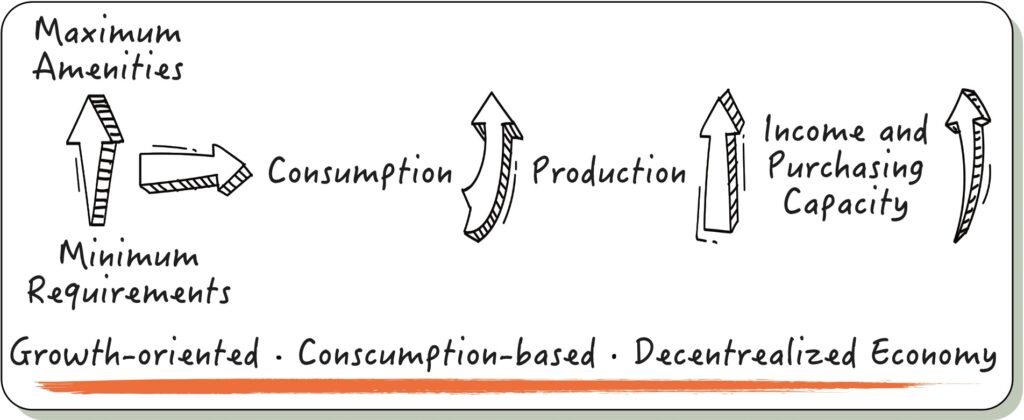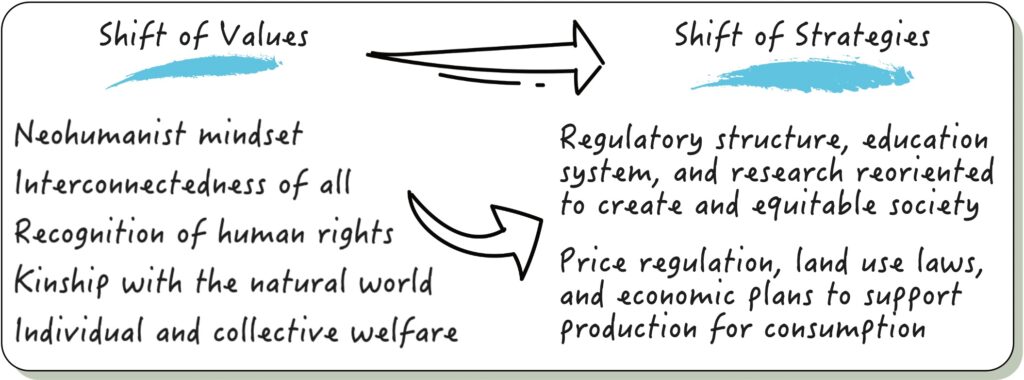
Shriraksha Mohan
Consumerism-based economies like capitalism view the consumption of commodities as the primary driver of profits. Hence, limitless consumption of goods and services is encouraged, whether one needs them or not. Capitalism encourages a high degree of debt among consumers.
According to French philosopher Gilles Lipovetsky, we are at a stage in capitalism marked by the global rise of ‘hyperconsumption’.4 Lipovetsky opines that in this stage, we are seeing a massive expansion in the quantity of consumer goods available to individuals and households. An ever-increasing opportunity to consume more, aided by globalization of trade, has increased per-capita consumption in the developed parts of the world. He observes an increase in hedonistic consumption more than need-based consumption.
When profit motive drives consumption, companies are heavily invested in advertising their products to their consumers. Advertising to imprint a desire for consumption in the minds of consumers leads to a waste of resources and capital that could have been better utilized to improve the quality of the product itself. Furthermore, the goal of advertisements is to encourage the behavior of ‘hyperconsumption’ among customers.
Conscious consumption
The Progressive Utilization Theory or Prout is an alternative and holistic socio-economic system proposed to replace the failing capitalist model of economy. With an emphasis on rational utilization and equitable distribution of the planet’s resources, Prout offers a model to build a world in which all people and the planet thrive harmoniously.
Prout advocates for improving the living standards of all through guaranteed necessities, rights to jobs, and balanced economic growth in a three-tiered economic system. In this system, locally owned cooperatives play a significant role in the economy alongside private businesses and the public sector.2
Prout advocates for the organization of an economy based on five principles of decentralized economy:3
- Local people control the local resources of a region.
- Production is based on consumption, not profit.
- Local cooperatives produce and distribute essential commodities.
- Full employment of local people in local cooperatives and economic enterprises.
- Regulation of local markets by removing non-locally produced commodities.
The second principle of a decentralized economy suggests production is based on consumption, not for profit. This raises many questions:
- What does production only for consumption mean?
- Why should there not be a profit motive? Does this mean economic enterprises receive no profit at all?
- How is this implemented and what does it change about how we think about the economy?
- What is consumption in a Prout system?
Answering these questions brings clarity about the nature of consumption and production in an increasingly ecologically and human rights conscious world.
While Prout supports an economic growth model, in which an increase in purchasing capacity and consumption leads to improved living standards for all, ‘hyperconsumption’ by a small group of rich individuals at the cost of the environment, and wellbeing of the less privileged is not supported.
Communism, on the other hand, is a command economy in which the nature of consumption is decided by the government or central authority, without consideration of the diversity of human needs and choices. Under communist regimes, a person with special skills and education is made to work and live at the same level as anybody else. Most communist economies have resulted in depriving the people of their agency to determine their economic future. In a Prout model, mindless consumerism is discouraged, while consumption based on the diversity of human needs and tastes is supported.
Needs and amenities
Prout, with its decentralized approach to planning, is a bottom-up economy that starts at the grassroots and works its way up. In this system, there are several stages of consumption. Consumption in the first stage is needs-based, to guarantee the basic requirements of life to all. Consumption in the second phase provides additional amenities to meritorious people. After everyone’s basic needs are met, these amenities create incentives for individuals to use their skills to contribute to society.

There should be a constant effort to bridge the gap between basic needs and extra amenities, to constantly increase the living standards and quality of life for everybody. This leads to a progressive increase in consumption. When viewed in conjunction with the first principle of economic decentralization in Prout, it is apparent that increased consumption should not overshoot a socio-economic region’s resource capacity to produce goods and services, as local people manage their local resources.
Local people and planners of a socio-economic region, who manage their local resources, should be equipped with enough knowledge about the region’s limitations and utilize their resources wisely, to prevent resource depletion or ecological degradation. Local people will be equipped to plan their economies based on their needs and the availability of resources. In such an economy, the likelihood of ‘hyperconsumption’ is low.
Consumption can also take the form of common amenities shared by the community and special amenities to help the sick and disabled. Excess production is distributed rationally among people to enrich the living experience. Common amenities can include art galleries, museums, libraries, sports facilities, swimming pools, concert halls, and parks. In a Prout system, these amenities are considered a form of consumption of goods and services and can contribute immensely to increasing the standard of living and growth.
No profit?
This brings us to the question, “Why should there not be a profit motive?”
When profit becomes the motive for production in an economy, economic enterprises fail to make good judgments about their production standards, the ecological impact of their economic activity, the working conditions of the labor force, and other such factors that affect lives and livelihoods. We come across many instances where there is a strong correlation between profits and disasters.
A train carrying toxic chemicals derailed5 in East Palestine, Ohio, USA in 2023 causing pollution of soil, air, and water in the area of the derailment. The damage caused by this event to the environment and people may linger for many years to come. The railroad company operating the train that derailed did not want to assume responsibility for the disaster initially and later offered minimum assistance. Railroad companies ignoring critical safety standards to cut costs of operations and maximize profits have been identified as a root cause of many such disasters.
Similarly, think of the ecological damage caused by society’s excessive reliance on fossil fuels, a reliance orchestrated to enrich some countries and corporations at the cost of worsening global warming and climate change. The Intergovern-mental Panel on Climate Change6 has published one report after another highlighting the dangers of extraction of crude oil without respecting the natural ecosystem’s ability to support such an economy. Yet, profits from the commodification of fossil fuels make oil and gas companies extract oil relentlessly, and block efforts to end the reliance on fossil fuels.
Profit motive leads to production monopolies, the concentration of wealth in a few hands, and superfluous production that can overshoot a region’s ability to regenerate its resources. In a profit-oriented system such as capitalism, solutions to day-to-day problems are commodified by attaching a price tag to them. For example, healthcare is a basic requirement of life and a human right. But even basic medical care is unaffordable to many in the United States. When an essential industry like healthcare is run for profit, it leads to a situation where people are deprived of their basic right to live. Should this be an outcome of our economic activities?
A healthy economy should serve the people and the planet. But in a profit-oriented economy, people and the planet serve the economy to maximize the material gains of a few individuals. Prout, on the other hand, prohibits the production and distribution of essential commodities based on profit motive.
Does this mean economic enterprises receive no profit at all?
Rational Profits
How would any economic enterprise continue operating without making profits to reinvest in production and operations? Prout places emphasis on rational profits. The suggested upper limit for profits cooperatives under Prout can make is roughly 15% of the cost of production.7 This profit is also based on rational costs of production, taking into account the cost of raw materials, cost of labor, cost of transportation and storage, depreciation, etc.
Most of the production, especially, the production of essential goods in a socio-economic unit is undertaken by local cooperatives that employ local people (principle #3 and #4 of decentralized economy), and non-local commodities are removed from the market for the sole purpose of supporting local cooperatives (principle #5 of decentralized economy). Progressive growth in consumption in a Prout model, as discussed earlier, creates incentives for local cooperatives to produce more and grow in safe spaces without competition from external market monopolies.
The profits these economic enterprises make naturally see an upward trend with an upward trend in consumption and production. Profits are reinvested in the local region as wages for local people, and for increasing production. Therefore, in a growth-oriented Prout economic model, profits are always ensured, even if they are not the primary goal of production. An increased purchasing capacity, improved living standards and economic security follow.
“To create 100% employment among local people, PROUT supports both a short term and a long-term economic plan. In the short-term plan, labour intensive industries based on the collective minimum requirements of life should be started immediately or made more productive where they already exist. These industries should be based on the consumption motive. They should also provide a rational profit in order to guarantee adequate purchasing capacity to those employed in them and to ensure their continued existence and growth.”8
Growth in consumption, growth in production, growth in profits and wages
Prout also recognizes the need to have key industries operated by the public sector. These are industries providing services like transportation, irrigation, telecommunications, mining, water purification, flood control, production of fertilizers, etc., that require a bigger scale of operation and affect the lives of many, beyond the scope of a local region. These industries may draw upon resources across various regional boundaries to function at a larger scale. These enterprises must be run on a “no profit, no loss” basis, and must be managed by the immediate local government.
The private sector should be restricted to goods and services deemed as luxury or non-essential. This ensures private businesses with profit motives cannot adversely affect the livelihoods of common people, whose minimum necessities must be guaranteed. Prout’s system of decentralized economy discourages monopolies that exist solely for profits. Hence, the private sector too will be forced to adopt pricing strategies to gain a comparative advantage over competing cooperative enterprises, and not just focus on profits.
What may be deemed non-essential in this day and age, may become an essential commodity in a few years. Principles of economic decentralization are applied under the consideration of time, place, and personal factors. Production and consumption are adjusted accordingly in a Prout system.
How is this implemented? What does it change about how we think about the economy?
“Production for consumption, not for profits”9 – embracing this idea calls for a paradigm shift of mindset and values. A shift that requires unlearning the old ways of thinking about and organizing an economy that works for a few, and learning new ways of building an economy that works for all, “ground up”.
Values
Our personal values determine how we structure our lives. Our values also determine how we structure the larger economy and society. The way we think about structuring our economies and society will also have to undergo a fundamental shift. A shift of values in the psychological sphere translates into a shift of strategies in the practical sphere.

The spiritual and ecological perspective to growth in a Prout system is firmly rooted in the integrated philosophy of Neohumanism, a worldview characterized by love, care, and compassion for all beings of the universe. Socio-economic strategies based on this worldview tend to be caring, inclusive, fair, and non-exploitative. When our strategies for consumption and production are based on Neohumanist values, then these strategies tend to support the idea of considerate consumption-oriented production, which is not motivated by profits alone.
“Prout is the path of socio-economic emancipation for humanity. Prout should go side by side with the psychic approach of Neohumanism. Neohumanistic ideas give human beings the impetus to move. They create a longing for subtler pabula, and that pabula is supplied by Prout. The spirit is to maintain a balance between the physical and psychic worlds and take human beings to the threshold of spirituality.”1
A shift of mindset and values starts with Neohumanist education. Embracing Neohumanism empowers humans to take benevolent actions, to recognize the interconnected nature of all life forms, to acknowledge everyone’s right to live a good life, and realize individual well-being lies in collective well-being. An ideal system of education must also inculcate a sense of morality and duty toward one’s fellow beings, and develop one’s ability to think rationally.
“The noblest form of social service is to educate the public and create a sense of consciousness in them. This sense of consciousness is to be inculcated in each and every human being. This is your duty. The goal of education is to elevate the all-round standard, and especially the intellectual standard. In addition, the elevation of the moral standard is extremely necessary in the sphere of education. This moral standard is deficient today. It is lacking in the present educational system also. You are to create a new social order. Therefore, you should first acquire more and more knowledge in different spheres of life and also you are to upgrade your morality. Along with your intellectual standard, if you have morality, then everybody will respect you. Try to acquire as much knowledge as possible through our own books. Education which leads to the acquisition of knowledge plus morality makes for a peaceful society.”10
A shift of values that can occur with the wholehearted acceptance of Neohumanism leads to a shift of strategies for organizing our society and economy. Prout’s economic decentralization principles guide the shift of strategies. A thorough understanding of the nature of consumption and production within a Prout framework will influence this process.
A shift of strategies includes education and research to analyze society’s consumption and production patterns. Strict regulations and Prout policies based on research outcomes could become strategies to move the economy away from an extractive, exploitative, and profit-oriented production model, and reorient it to create equitable socio-economic conditions for progress. Sound policies have the potential to foster behavioral change.11
Incentives, bans, mandates, etc are policy instruments that can nudge people to change consumption and production patterns and steer the economy in the right direction. These instruments can be used to implement Prout’s principles of a decentralized economy. For instance, higher taxes on luxury or non-essential commodities can discourage the behavior of overconsumption, and reorient the production process to create more essential commodities.
A shift towards Neohumanism helps lawmakers frame laws to protect local cooperatives, human rights, and the environment through strong legislation. All these measures go hand-in-hand within a decentralized and democratic economic structure, where the focus is on socio-economic empowerment, and not on profits.
Neohumanism, as the bedrock of Prout’s strategies, inspires inclusive and holistic economic growth. This model of organizing economies acknowledges that collective and individual well-being are interdependent, and also honors the rights of the natural world. Progressive socio-economic strategies, guided by Prout, follow a shift of values guided by Neohumanism.
References
1. Sarkar, Shrii Prabhat Ranjan. ‘Prout and Neohumanism’, Prout in a Nutshell Part 17, Ananda Marga Publications. (1989)
2. Maheshvarananda, D. and Branch, M. ‘The Progressive Utilization Theory (Prout): Alternative Economic and Spiritual Model for the Welfare of All’, WorkingUSA, 13(1), pp. 31–40. (2010)
3. Sarkar, Prabhat Rainjan. ‘Decentralized Economy – 1’, Prout in a Nutshell Part 21, Ananda Marga Publications. (1982)
4. Lipovetsky, Gilles. ‘The Hyperconsumption Society’. (2011)
5. Perkins, Tom. ‘We Just Need Answers’: Distrust Grows in Ohio Town after Toxic Train Derailment.” The Guardian, February 19, 2023, sec. US news.
6. Lewis, Simon. ‘The IPCC’s Climate Report Has Drawn the Battle Lines for Cop28: Oil Profits or a Livable Future’. The Guardian, March 21, 2023, sec. Opinion. .
7. Sarkar, Prabhat Ranjan. ‘Questions and Answers [on Society] – 3’, Prout in a Nutshell Part 14, Ananda Marga Publications (1988), ‘Questions and Answers [on Society] – 4’, Prout in a Nutshell Part 18 (1991).
8. Sarkar, Prabhat Ranjan. ‘Socio-Economic Movements’, Prout in a Nutshell Part 13, Ananda Marga Publications. (1984)
9. Sarkar, Prabhat Ranjan. ‘Economic Dynamics’, Proutist Economics, Ananda Marga Publications (1992).
10. Sarkar, Prabhat Ranjan. ‘Message to Teachers’, Discourses on Neohumanist Education, Ananda Marga Publications (1986).
11. Tummers, Lars. ‘Public Policy and Behavior Change’. Public Administration Review 79 (October 1, 2019). https://doi.org/10.1111/puar.13109.
Shriraksha Mohan is a student of Prout and an activist, who realized there is a dire need for systemic changes in the social, economic, and cultural spheres of existence to create an equitable and sustainable world. She has a Master’s Degree in Computer Science and worked as a software professional for several years. She is now pursuing a Master's Degree in Heterodox Economics. As an active member of Prout Alliance and Proutist Universal, she is invested in Prout advocacy to raise socio-economic awareness through Prout education, writing, and outreach efforts on Prout's social media. She is the co-author of a chapter on Prout in the book, Climate Adaptation: Accounts of Resilience, Self-Sufficiency and Systems Change. She serves on the board of Prout Research Institute in Asheville, North Carolina, USA.

